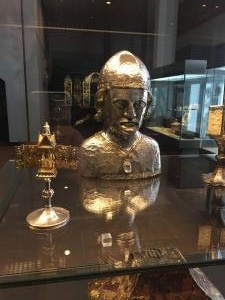We reported last week on the outrage over the decision by Germany and the Stiftung Preussischer Kulturbesitz (SPK) to argue in their motion to dismiss my clients’ claims to the Welfenschatz that a commercial interaction between German Jews and a cabal instigated by Hermann Goering in 1935 “predated the Holocaust by several years.” As we noted last week, the suggestion that the Holocaust was a distant possibility in 1935 was an indefensible statement, factually, historically, and ethically. The initial reaction was swift and severe. As Germany gets ready to host the First Conference of the German Centre for Cultural Property Losses next week, its policies are hurtling in the wrong direction.
Widespread Criticism Continues from Historians Over Germany’s and SPK’s Revisionism Concerning Holocaust and Forced Sales of Art
Topics: Jewish Week Mel Urbach, Hermann Goering First Conference of the German Cen, Gesetz zur Wiederherstellung des Berufsbeamtentums, Henning Kahmann, Atlanta, Simon Wiesenthal Center, Varda Neumann Federal Administrative Court, Yale University, Marion Kaplan, New York University, Germany, Nazi-looted art, Hitler, Kristallnacht Rabbi Abraham Cooper, Deborah Lipstadt, U.S. Holocaust Memorial Museum, Markus Stoetzel, Emory University, Behrens, Holocaust, Bloodlands, SPK, Advisory Commission, Black Earth: The Holocaust as History and Warning, Stiftung Preussischer Kulturbesitz, Restitution, Los Angeles, World War II, Law for the Restoration of the Professional Civil, Washington, Raubkunst, Timothy Snyder, Welfenschatz
Boston Globe Publishes Article on Welfenschatz Case
The Boston Globe published a story today entitled “Gift to Hitler spurs a claim for justice" about the Welfenschatz case that I filed for my clients earlier this year.
Topics: Gurlitt Collection, Hitler, Boston Globe, Restitution, World War II, Welfenschatz
The Woman in Gold: Why the Altmann Case Matters
The release last week of The Woman in Gold, the feature film adaptation of The Lady in Gold by Anne Marie O’Connor, starring Helen Mirren and Ryan Reynolds as Maria Altmann and her attorney E. Randol Schoenberg, respectively, as well as Tatiana Maslany as the younger Altmann and Daniel Brühl as Austrian journalist Hubertus Czernin, is an important opportunity to reflect on the legal importance of the case. Even today, the case provides lessons about the way some victims are still treated, and how one individual can make sure the past is never forgotten. The looting of Jewish art collections was a concerted effort whose prominence should never be forgotten. And perhaps even more, it robs those who did survive of the dignity of remembering their family experiences. Consider: the next time you gather with your extended family, look around the room. Pick something that you’re accustomed to seeing when the family meets. Now, imagine it had been stolen or surrendered under duress, and was hanging on the wall of a national collection that denied it had been taken. How would you feel? This is the dilemma faced by many claimants, and it is precisely why Altmann matters so much.
Topics: Maria Altmann, The Lady in Gold, Adele Bloch-Bauer, The Woman in Gold, Daniel Brühl, Germany, Nazi-looted art, Academy of Fine Arts, Foreign Sovereign Immunities Act, Hitler, Tatiana Maslany, Anne Marie O’Connor, Supreme Court, A Few Good Men, Belvedere, E. Randol Schoenberg, World Jewish Congress, Stiftung Preussischer Kulturbesitz, Ryan Reynolds, FSIA, expropriation exception”, Restitution, Neue Galerie, World War II, Foreign Sovereign Immunities, Switzerland, Ferdinand Bloch-Bauer, Helen Mirren, Museums, Fritz Altmann, Gustav Klimt, Vienna, Welfenschatz, Hubertus Czernin, Ronald Lauder, Austrian National Gallery




